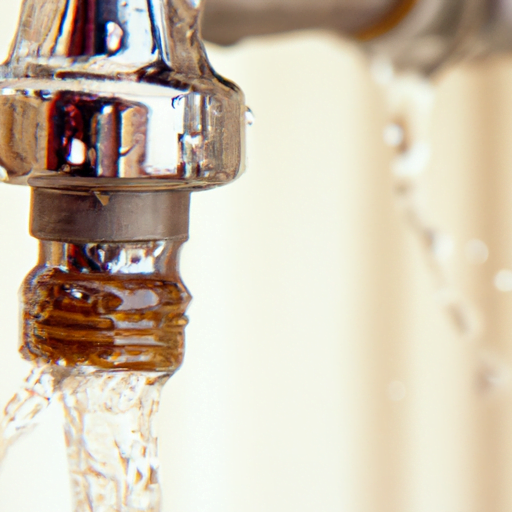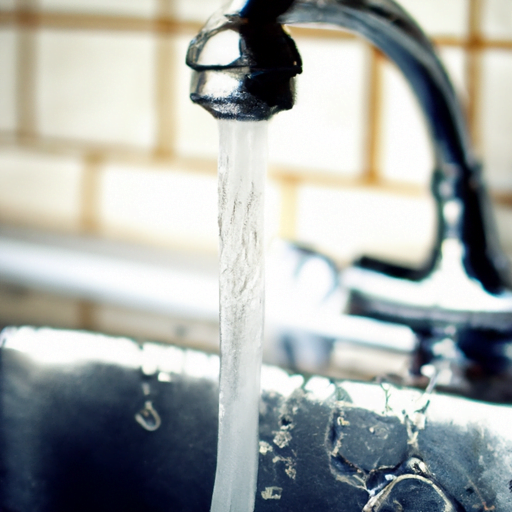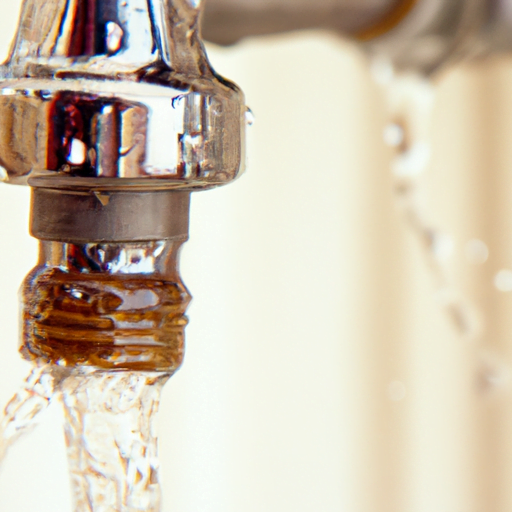So, you’ve decided to go off the grid and embrace a simpler way of life. It’s an exciting decision, but now you find yourself faced with some practical questions. One question that often comes up is: can you ever run out of well water? After all, your main water source will now be the well on your property, so it’s natural to wonder about its sustainability. Well, let’s dive into the topic and explore whether or not you should be worried about running out of well water.
First things first, let’s talk about the basics of well water. Unlike city water, which is supplied through a centralized system, well water is drawn from an underground source. This means that as long as there is water in the ground, you’ll have a supply. But how exactly does the water get replenished? It’s all about the water cycle. Rainfall, snowmelt, and other forms of precipitation recharge the aquifers, which are the underground reservoirs that supply well water. So, as long as Mother Nature keeps providing water, your well is likely to stay filled.
Of course, there are factors that can affect the sustainability of well water. One crucial factor is the rate of water withdrawal. If you’re using massive amounts of water on a daily basis, it could put strain on the well and lead to water scarcity. It’s essential to be mindful of your water usage, especially if you live in an arid region or during times of drought. Another element to consider is the depth of your well. If your well taps into a shallow aquifer, there might be a higher risk of running out of water, as shallow aquifers can be more susceptible to depletion.
In conclusion, while it’s technically possible to run out of well water, it’s unlikely if you’re mindful of your water usage and take the necessary precautions. The sustainability of well water depends on factors such as the availability of precipitation, the depth of your well, and your water consumption habits. As you embark on your off-grid journey, it’s always a good idea to monitor your well water levels and make conservation a priority. In our upcoming article, we’ll delve deeper into practical tips for conserving well water and ensuring a sustainable and reliable water supply for your off-grid lifestyle.

Exploring Off Grid Living
Living off the grid is a lifestyle choice that offers numerous benefits, but it also comes with its fair share of challenges. One of the most crucial aspects to consider when living off the grid is the availability of water. In this article, we will delve into the sustainability of well water in off-grid properties, exploring the factors that affect its availability, potential threats it faces, conservation techniques, alternative water sources, and advancements in well water management. By the end of this article, you will have a better understanding of the sustainability of well water and whether you can ever run out.
Benefits of Living Off the Grid
Living off the grid has gained popularity in recent years due to its sustainability and self-reliance. The primary benefit of this lifestyle is the independence it offers from traditional utilities and the associated costs. By generating your own electricity, managing waste appropriately, and sourcing water from natural sources such as wells, you reduce your reliance on external services and minimize your carbon footprint. Additionally, living off the grid allows you to connect with nature, cultivate a sense of self-sufficiency, and enjoy a simpler, potentially more fulfilling way of life.
Challenges Faced in Off Grid Living
While living off the grid has its advantages, it also presents unique challenges. One of the main hurdles is the limited availability of resources, primarily water. Unlike urban areas connected to municipal water systems, off-grid properties rely on self-sustaining water sources, such as wells. These water sources can be unpredictable and subject to external factors that may affect their sustainability.
Sources of Water in Off Grid Properties
Well water is a commonly used source of water in off-grid properties. However, understanding well water and its sustainability requires exploring various factors, including how it is obtained and its advantages.
What is Well Water?
Well water refers to the water found underground in aquifers, which are natural underground reservoirs that collect and store water. This water is typically accessed through a well, which is a hole drilled into the ground to reach the aquifer. Well water is often naturally filtered as it passes through layers of soil and rock, resulting in cleaner and fresher water compared to other sources.
How is Well Water Obtained?
Obtaining well water involves drilling a well using specialized equipment. Once the well is drilled, a pump is installed to draw the water to the surface, where it can be stored and used. The depth of the well and the volume of water available depend on various factors, such as the geological characteristics of the area and the water table’s level.
Advantages of Well Water
There are several advantages to using well water. First and foremost, well water is typically free of the chemicals and additives found in treated municipal water supplies. This can result in better-tasting water that is also beneficial for various household uses, including drinking and cooking. Additionally, well water is not subject to the disruptions that may occur in municipal water supplies, such as water restrictions or service interruptions.
Factors Affecting Well Water Sustainability
Understanding the factors that affect the sustainability of well water is crucial when considering the long-term availability of this valuable resource.
Geographical Location and Well Water Availability
The geographical location of an off-grid property plays a significant role in the availability of well water. Regions with high rainfall and ample water sources are more likely to have sustainable well water supplies. In contrast, arid regions or areas with limited water resources may face challenges in accessing or maintaining sufficient well water.
Water Table and Its Impact on Well Water
The water table, or the level at which groundwater is found, is another critical factor in well water sustainability. If the water table is high, meaning the aquifer is close to the surface, it is generally easier to access and maintain well water. However, if the water table is low, the well may require deeper drilling, resulting in increased costs and potentially limited water availability.
Human Consumption and Well Water Depletion
The amount of water consumed by humans and the surrounding ecosystem plays a significant role in well water sustainability. Overconsumption or excessive pumping of groundwater can deplete the aquifer, leading to reduced water availability and potential well water shortages. Therefore, responsible water usage practices are essential to maintaining the sustainability of well water.
Potential Threats to Well Water Supply
Well water sustainability can be threatened by various factors, including drought, contamination risks, and over-pumping.
Drought and Its Effects on Well Water
Drought conditions can significantly impact the availability of well water. During periods of drought, the water table may drop, making it more challenging to access sufficient water from wells. As a result, well owners may need to rely on alternative water sources or implement conservation measures to sustain their water supply.
Contamination Risks and Well Water Quality
Contamination is another potential threat to well water supply. Contaminants can enter the underground aquifer through various means, such as improper disposal of hazardous substances, agricultural runoff, or naturally occurring minerals. Regular water testing is essential to identify any potential contaminants and ensure the safety and quality of well water.
Over-pumping and Depletion of Well Water
Over-pumping occurs when the rate at which water is extracted from a well exceeds the natural recharge rate of the aquifer. This can lead to a depletion of well water and potentially render the well non-functional. Balancing the rate of pumping with the sustainable recharge rate is crucial to avoid over-pumping and maintain the long-term availability of well water.

Well Water Conservation Techniques
Implementing water conservation techniques is vital to sustaining well water supplies. By reducing water consumption and implementing innovative methods to capture and reuse water, the sustainability of well water can be preserved. Some effective conservation techniques include:
Implementing Water-Saving Measures
Simple changes in daily habits can significantly reduce water consumption. Installing low-flow fixtures, fixing leaks promptly, and practicing water-conscious behaviors such as turning off the tap while brushing your teeth can all contribute to significant water savings.
Rainwater Harvesting for Supplemental Supply
Rainwater harvesting involves capturing and storing rainwater for later use. This practice is particularly beneficial for off-grid properties as it provides an additional water source, supplementing well water during periods of low rainfall.
Water Reuse and Recycling Methods
Implementing water reuse and recycling systems allows off-grid residents to maximize the utilization of available water resources. Greywater systems, which collect used water from sinks, showers, and laundry, can be treated and recycled for non-potable uses such as irrigation, reducing the reliance on well water for such purposes.
Alternative Water Sources for Sustainability
While well water can be a reliable source, exploring alternative water sources can provide additional security for off-grid properties.
Exploring Alternative Water Sources
Alternative water sources such as rivers, lakes, or streams can complement well water supplies. However, careful consideration must be given to the availability and accessibility of these sources, along with any legal restrictions or regulations governing their use.
Desalination as an Option for Water Security
For coastal off-grid properties, desalination can be a viable option for obtaining water. Desalination involves the removal of salt and other impurities from seawater, making it suitable for human consumption and various other uses. While desalination technology has improved over the years, it still requires significant energy inputs and can be expensive to implement and maintain.
Community Water Sharing Initiatives
In some cases, off-grid communities may come together to share water resources. By pooling their resources, residents can ensure a more reliable and sustainable water supply, especially during periods of scarcity.
Advancements in Well Water Management
Advancements in technology and irrigation systems have improved the efficiency of well water management, contributing to its sustainability.
Technology for Efficient Well Water Monitoring
Technological advancements have made it possible to monitor well water levels and usage in real-time. Well owners can use sensors and data analysis to ensure optimal water use and identify any potential issues promptly. This helps prevent over-pumping and facilitates better water management.
Smart Irrigation Systems for Conservation
Smart irrigation systems utilize sensors and weather data to automate watering schedules and ensure efficient water usage. By delivering water only when necessary and in appropriate amounts, these systems can significantly reduce water waste and contribute to overall conservation efforts.
Predictive Analytics in Well Water Management
Predictive analytics tools can analyze historical well water data to predict future water availability and identify potential risks or challenges. This helps well owners make informed decisions regarding water usage, conservation, and maintenance plans.
Government Policies and Regulations
Governments play a crucial role in the management and regulation of well water resources. Various policies and regulations are in place to ensure the sustainability of well water supplies.
Role of Government in Well Water Management
Government agencies are responsible for monitoring and regulating water resources, including well water. They develop policies and guidelines to promote responsible water usage, prevent over-pumping, and address potential contamination risks. It is essential for well owners to understand and comply with these regulations to ensure the sustainable use of well water.
Laws and Regulations Pertaining to Well Drilling and Usage
Laws and regulations regarding well drilling and usage vary by region. These laws typically govern aspects such as drilling permits, well construction standards, and required water quality testing. Adhering to these regulations is crucial to protect the environment and ensure the long-term sustainability of well water.
Incentives for Sustainable Water Practices
Some governments offer incentives, such as tax credits or grants, to encourage sustainable water practices. These incentives may include financial assistance for implementing water-saving technologies, promoting research and development of efficient irrigation systems, or supporting community water-sharing initiatives. Taking advantage of these incentives can help individuals and communities further their conservation efforts.
Awareness and Education
Raising awareness and providing education on well water sustainability are essential for long-term conservation efforts.
Educating Communities on Well Water Sustainability
Educating communities about the importance of well water sustainability and conservation practices can promote responsible water usage. This can be achieved through workshops, informational campaigns, or community events aimed at raising awareness and providing practical guidance.
Promoting Responsible Water Usage Habits
Individuals should be encouraged to adopt responsible water usage habits, such as taking shorter showers, fixing leaks promptly, and using water-efficient appliances. By engaging in conscious water practices, individuals contribute to the overall sustainability of well water.
Engaging in Public Outreach Programs
Engaging in public outreach programs allows well owners and organizations to reach a larger audience and disseminate valuable information about well water conservation. Collaborative efforts between individuals, communities, and government agencies can help create a collective commitment to sustainable water practices.
Conclusion
Ensuring the sustainability of well water is vital for off-grid communities seeking long-term self-sufficiency and conservation. While there are challenges and potential threats to well water supply, implementing water conservation techniques, exploring alternative water sources, and utilizing advancements in well water management can contribute to its sustainability. Balancing water needs with conservation efforts is key, and collaboration between individuals, communities, and governments is essential to promote responsible water usage and ensure a reliable supply of well water for years to come. So, can you ever run out of well water? With proper management and awareness, the answer is a resounding no.




